Book contents
- Frontmatter
- Contents
- Abbreviations and acronyms
- Preface
- Prologue The Johannesburg Moment
- Acknowledgements
- CONVERSATION 1 SOCIOLOGY AS A COMBAT SPORT
- CONVERSATION 2 Theory and Practice
- CONVERSATION 3 CULTURAL DOMINATION
- CONVERSATION 4 COLONIALISM AND REVOLUTION
- CONVERSATION 5 PEDAGOGY OF THE OPPRESSED
- CONVERSATION 6 THE ANTINOMIES OF FEMINISM
- CONVERSATION 7 INTELLECTUALS AND THEIR PUBLICS
- CONVERSATION 8 MANUFACTURING DISSENT
- Epilogue Travelling Theory
- Bibliography
- Index
Prologue - The Johannesburg Moment
Published online by Cambridge University Press: 20 April 2018
- Frontmatter
- Contents
- Abbreviations and acronyms
- Preface
- Prologue The Johannesburg Moment
- Acknowledgements
- CONVERSATION 1 SOCIOLOGY AS A COMBAT SPORT
- CONVERSATION 2 Theory and Practice
- CONVERSATION 3 CULTURAL DOMINATION
- CONVERSATION 4 COLONIALISM AND REVOLUTION
- CONVERSATION 5 PEDAGOGY OF THE OPPRESSED
- CONVERSATION 6 THE ANTINOMIES OF FEMINISM
- CONVERSATION 7 INTELLECTUALS AND THEIR PUBLICS
- CONVERSATION 8 MANUFACTURING DISSENT
- Epilogue Travelling Theory
- Bibliography
- Index
Summary
Forty years ago, in the early 1970s, Durban experienced a ferment of new ideas that were to profoundly shape resistance to apartheid. The central figures in this ferment were two charismatic intellectuals, Steve Biko and Rick Turner. Biko and his comrades founded the Black Consciousness movement and its organisational forms, the South African Students’ Organisation and the Black People's Convention, from which emerged a new generation of political activists who went on to organise trade unions, community organisations and the United Democratic Front. Rick Turner's ideas about participatory democracy and the projects he initiated to support a nascent black trade union movement, partly in response to the challenge of Black Consciousness, influenced many of those who contributed to the building of the trade union movement.
The Durban ferment was not only about the ideas of intellectuals; it was also about a shift in popular consciousness. In 1973 some 100,000 workers participated in a wave of strikes in Durban, breaking with the quiescence of the 1960s. By the end of the decade both Biko and Turner had been killed by the Security Police. Their ideas, however, continued to shape the resistance movement in different ways throughout the 1980s.
This was what Tony Morphet – drawing on Raymond Williams's idea of a structure of feeling – called the ‘Durban moment’, constituted by profound shifts in ideas and consciousness among intellectuals and workers, and setting off far-reaching reverberations across South Africa, way beyond the immediate locale of Durban (Morphet, 1990: 92–93; Webster, 1993).
That was the Durban moment. This book is subtitled ‘the Johannesburg moment’. What do we mean by this?
At the simplest level, the title is a reference to the fact that the book grew out of a series of lectures on Pierre Bourdieu, the great French sociologist, given at the University of the Witwatersrand in Johannesburg in 2010. The significance of the reference to place is not simply that the lectures took place here, but that they presented an occasion for interrogating the relevance of Bourdieu's work to South Africa – and, more importantly, confronting the meaning of South Africa for Bourdieu's theory. It is through exploring the significance of this interrogation and confrontation that we can arrive at some sense of the possible meaning of a ‘Johannesburg moment’.
- Type
- Chapter
- Information
- Conversations with BourdieuThe Johannesburg Moment, pp. 1 - 6Publisher: Wits University PressPrint publication year: 2012

